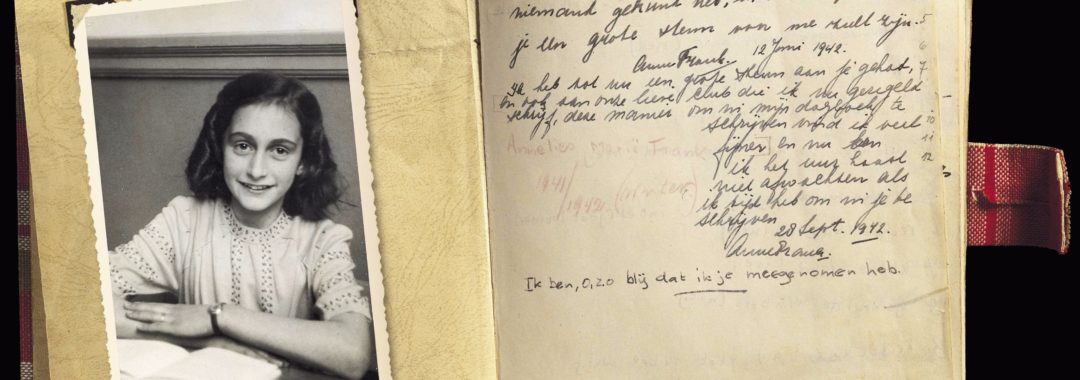I have kept her photograph, which I purchased twenty-five years ago on my first trip to the Anne Frank House. I embarked on the narrow climb to the hiding place and later, the descent, and imagined all that had occurred in between. I was attuned to the voices of visitors speaking other languages as I looked out a window and considered the view and the sounds of Amsterdam’s streets and wondered if this is what Anne saw and heard. At that point, I withheld no emotion and unabashedly cried in front of everyone else in that room.
Only recently have I begun to comprehend the extent of her profound influence on my writing and working life which began with a spring play. As a fourteen-year-old, I auditioned for and won the role of Anne in my high school’s production of The Diary of Anne Frank. At that time, I had already read the Diary and attempted to watch a television dramatization, but couldn’t do so in one sitting as I darted in and out of the living room because of a seven-year-old’s fear. I didn’t know if what I was watching, a family living in hiding, was still happening. I wondered: “If the Frank family is in hiding, shouldn’t I be as well?”
Although the scenes appeared as mere shadows and whispers, I couldn’t make them disappear. With age came a clearer sense of past and present. Being on stage playing Anne protected me from those fears. I was engulfed in performing well without a single dropped line or missed cue. But as the fear abated, something else quietly manifested, an inner sense of responsibility.
Playing Anne, was the greatest moment in my high school life though I wish my initial reasons for being in this production were more profound. But as time references are vague in childhood, profundity in adolescence isn’t always achieved, and all I wanted to do at that moment was to act on stage.
I should have desired to play Anne because her heartbreakingly beautiful, and yes, profound text chronicles a historical and deeply personal experience that has spanned generations and transcended nationality and language. I should have wanted the part because her independent spirit and feminism breathe meaning and inspiration throughout the pages. Her palpable compassion, humanity and unwavering authenticity should have sufficed.
What followed was more high school theater, though nothing close to the emotional magnitude I experienced acting in Anne Frank. In college, I stopped acting to focus on writing because I wanted autonomy in my craft. There was nothing wrong with what I was writing because it was what I knew as an undergraduate, which wasn’t very much.
A serendipitous meeting with a sixty-something-year-old glamorous Belgian woman who directed a Master of Arts in Teaching program led to my work as an English as a Second Language teacher. When she asked me what I wanted, I said I wanted to go to an area of conflict and work with women and children. She didn’t actually dissuade me, but challenged me by asking what were my personal connections to war. At that time, I had none. Years later, I learned she, as a teenager in Belgium, worked with her mother in hiding Jewish families during the Holocaust and that they both had been honored.
I returned to the Anne Frank House a second time when I was in Amsterdam interviewing with an organization that uses the creative arts therapies as a modality in helping children who have experienced war. I had already taught immigrants in the United States and had worked as a drama therapist with refugee and returning women and children in Sarajevo and Tbilisi. I had pursued this work and traveled to areas of war with no intention of writing what I would witness. Perhaps it was a tacit acknowledgement of that part of my story ending. But the voices of the women I met, particularly in Sarajevo, found a steadfast place in my writing which was not yet finished, as stories of systematic rapes and the children born from those rapes became the essence of my play, The Fallen.
Someone once asked me if my life would have been different if I hadn’t been cast as Anne Frank, if I hadn’t even auditioned. Would I have engaged in work with immigrants, refugees, asylum seekers, women in war zones? Would I have told their stories? Now, if asked why I wanted to play Anne Frank, I’d have my answer.
This article was originally published on The Lilith Blog. You can read the original post here.
